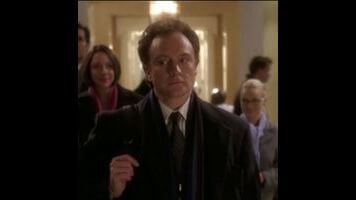The West Wing: "The Midterms"/"In This White House"

As morbid a thought as this is, I love episodes of television just after something tragic or painful occurs. It's simple human nature to actively avoid having harsh thoughts, so often characters (and, really, people) unhealthily fixate on something, anything, whatever's around, until there's nothing left. It's heartbreaking to watch the simplest things invoke the strongest collapse. The most salient example that springs to mind is from, forgive me, Friday Night Lights and its latest season. I know, it's not The West Wing, but I've been thinking about this one episode in particular because it recently reaired on NBC (I'll try not to spoil much of anything): Matt Saracen deals with a lost loved one by pretending everything's fine, then showing up late to the Taylor's house for dinner only to pick at his food. He doesn't like carrots, he says, twirling them around on his plate. Carrots. Not having 'em. Carrots, carrots, carrots…
Of course, I just find it fascinating the way people deal with uncomfortable moments in general, even if lighter-hearted. My friend Jon loves to tell the story of when he was in high school and he accidentally left a condom wrapper in his parents' car—you know, from the night before. His dad walked into the living room, set the wrapper in front of him, and said, "I think this is yours." There was a slight pause. "Thanks," Jon replied, then he watched TV more intensely and focused than he's ever watched anything before in his entire life.
I enjoyed these two episodes of The West Wing because they gave our characters a chance to work out their inner demons surrounding the shooting. The first two episodes this season demonstrated what they're doing consciously, now it was time to watch them tackle the subconscious effects. The first one takes place over a 12 week span, so much of this is devoted to the slow build of tension. Charlie, of course, bears the brunt of the load, so riddled with guilt he distances himself from Zoey. (Confused, Zoey seeks out guidance from other staffers, and one of my favorite moments is when she says to Leo, "Have you noticed how Charlie—" before getting swiftly cut off.) Toby becomes fixated on leveraging the shooting as a way to pass a cocktail of policies—gun control, hate group registries within the FBI, and so on. The President has his own fixation, on a silly little school board election in which his former opponent is heavily favored. So he holes himself up in the residence and makes some calls, sticking his nose where it doesn't belong with such dedication, he can't even distinguish anymore when a phone call is on hold or, in fact, over.
The solution to Charlie's dilemma comes from an outside source, which I've noticed is a favorite little device of Aaron Sorkin's. The technician on call, after weeks of casual conversations with Charlie, offers up some quick advice only a bystander could muster: "If they're shooting at you, you know you're doing something right." The apex of the episode, I found, is actually what happens between Toby and Bartlet, as they're able to take a baby step towards healing together. One brilliant moment begets another. Toby, finally allowed to talk his plan through with the President, breaks down, the false backbone he built on prospective policy finally giving way. "We witnessed a lynching," Bartlet says. The President, meanwhile, finds his own backbone in the wake of this moment, letting Dr. Jenna Jacobs (aka Laura Schlessinger) have it at a White House radio function, quoting scripture even more ridiculous than the Dr.'s chosen passage condemning homosexuality.
Watching that moment happen, a thought crossed my mind that I had to immediately put in check. "This is sort of cliche," I thought, which of course is ridiculous, but also telling. This was a primetime network TV show, and these sorts of issues hadn't been discussed this way before. In fact, the format of the argument had only appeared in the form of an anonymous open letter to Laura Schlessinger. Inclusion in the episode fanned the flames of the antigay movement, but certainly doused their impact overall. The moment seems cliche because it was so substantial, it has been repeated over-and-over since. But hearing the argument from the (fictional) President of the United States was certainly the most memorable I've ever heard it. (As my friend and colleague Genevieve Koski put it a few days ago when we talked about this scene, "Imagine if Obama did that.") It's a moment that demonstrates the power television can wield: putting into words a feeling existing in the collective conscious, and get it to a wide audience.








































